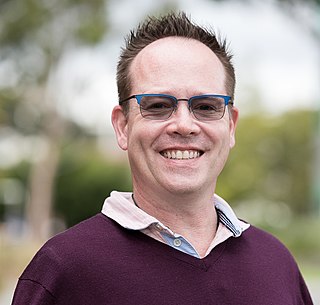Related Research Articles

Dysentery, historically known as the bloody flux, is a type of gastroenteritis that results in bloody diarrhea. Other symptoms may include fever, abdominal pain, and a feeling of incomplete defecation. Complications may include dehydration.

Entamoeba histolytica is an anaerobic parasitic amoebozoan, part of the genus Entamoeba. Predominantly infecting humans and other primates causing amoebiasis, E. histolytica is estimated to infect about 35-50 million people worldwide. E. histolytica infection is estimated to kill more than 55,000 people each year. Previously, it was thought that 10% of the world population was infected, but these figures predate the recognition that at least 90% of these infections were due to a second species, E. dispar. Mammals such as dogs and cats can become infected transiently, but are not thought to contribute significantly to transmission.

Harvey James Alter is an American medical researcher, virologist, physician and Nobel Prize laureate, who is best known for his work that led to the discovery of the hepatitis C virus. Alter is the former chief of the infectious disease section and the associate director for research of the Department of Transfusion Medicine at the Warren Grant Magnuson Clinical Center in the National Institutes of Health (NIH) in Bethesda, Maryland. In the mid-1970s, Alter and his research team demonstrated that most post-transfusion hepatitis cases were not due to hepatitis A or hepatitis B viruses. Working independently, Alter and Edward Tabor, a scientist at the U.S. Food and Drug Administration, proved through transmission studies in chimpanzees that a new form of hepatitis, initially called "non-A, non-B hepatitis" caused the infections, and that the causative agent was probably a virus. This work eventually led to the discovery of the hepatitis C virus in 1988, for which he shared the Nobel Prize in Physiology or Medicine in 2020 along with Michael Houghton and Charles M. Rice.

The University of Virginia School of Medicine is the graduate medical school of the University of Virginia. The school's facilities are on the University of Virginia grounds adjacent to Academical Village in Charlottesville, Virginia. Founded in 1819 by Thomas Jefferson, UVA SoM is the tenth oldest medical school in the United States, and is ranked 31st in research-oriented medical schools by U.S. News & World Report, and as of 2021, is ranked nineteenth in the nation in primary care. The School of Medicine confers Doctor of Medicine (M.D.) and Doctor of Philosophy (PhD) degrees, and is closely associated with both the University of Virginia Health System and Inova Health System.

Walter Ian Lipkin is the John Snow Professor of Epidemiology at the Mailman School of Public Health at Columbia University and a professor of Neurology and Pathology at the College of Physicians and Surgeons at Columbia University. He is also director of the Center for Infection and Immunity, an academic laboratory for microbe hunting in acute and chronic diseases. Lipkin is internationally recognized for his work with West Nile virus, SARS and COVID-19.

Amoebiasis, or amoebic dysentery, is an infection of the intestines caused by a parasitic amoeba Entamoeba histolytica. Amoebiasis can be present with no, mild, or severe symptoms. Symptoms may include lethargy, loss of weight, colonic ulcerations, abdominal pain, diarrhea, or bloody diarrhea. Complications can include inflammation and ulceration of the colon with tissue death or perforation, which may result in peritonitis. Anemia may develop due to prolonged gastric bleeding.

Amoebic brain abscess is an affliction caused by the anaerobic parasitic protist Entamoeba histolytica. It is extremely rare; the first case being reported in 1849. Brain abscesses resulting from Entamoeba histolytica are difficult to diagnose and very few case reports suggest complete recovery even after the administration of appropriate treatment regimen.

Dehydroemetine is a synthetically produced antiprotozoal agent similar to emetine in its anti-amoebic properties and structure, but it produces fewer side effects. In the United States, it is manufactured by Roche.
Pathema was one of the eight bioinformatics resource centers funded by the National Institute of Allergy and Infectious Diseases (NIAID), a component of the National Institute of Health (NIH), which is an agency of the United States Department of Health and Human Services.
Avindra "Avi" Nath, is a physician-scientist who specializes in neuroimmunology. Nath is a senior investigator, and intramural clinical director of the National Institute of Neurological Disorders and Stroke (NINDS) at the National Institutes of Health (NIH) in the United States. At NINDS, Nath also leads the Section of Infections of the Nervous System and plans to institute a translational research center. He previously served in several research and administrative positions at the Johns Hopkins Hospital and the Johns Hopkins University School of Medicine.
Entamoeba moshkovskii is part of the genus Entamoeba. It is found in areas with polluted water sources, and is prevalent in places such as Malaysia, India, and Bangladesh, but more recently has made its way to Turkey, Australia, and North America. This amoeba is said to rarely infect humans, but recently this has changed. It is in question as to whether it is pathogenic or not. Despite some sources stating this is a free living amoeba, various studies worldwide have shown it contains the ability to infect humans, with some cases of pathogenic potential being reported. Some of the symptoms that often occur are diarrhea, weight loss, bloody stool, and abdominal pain. The first known human infection also known as the "Laredo strain" of Entamoebic mushkovskii was in Laredo, Texas in 1991, although it was first described by a man named Tshalaia in 1941 in Moscow, Russia. It is known to affect people of all ages and genders.
Entamoeba invadens is an amoebozoa parasite of reptiles, within the genus Entamoeba. It is closely related to the human parasite Entamoeba histolytica, causing similar invasive disease in reptiles, in addition to a similar morphology and lifecycle.

Dean Hamilton Kedes is an American scientist in the field of virology and current director of the medical scientist training program at the University of Virginia school of medicine.
Thomas Charles Merigan was born January 18, 1934 in San Francisco. He is an American virologist and the George E. and Lucy Becker Professor of Medicine, Emeritus at the Stanford University School of Medicine. Merigan's research first focused on human viral pathogenesis, basic and clinical studies of interferon, and then developing the first systemically active antiviral drugs including those effectively treatIng HIV/AIDS, herpesviruses and hepatitis B. He is also credited with helping to develop the use of interferons as antiviral, immunomodulating and antitumor therapies. Merigan joined the Stanford faculty in 1963 and assumed full emeritus status in 2007. In 2004 he was also identified as one of the 250 most cited investigators in clinical medicine over the last 20 years by the Institute for Scientific Information. Merigan also was ranked 23rd among the 1000 top US microbiologists by Research.com. in 2022. He had over 95 postdoctoral fellows, students and visiting scientists with whom he published 577 papers, 24 books and published symposia, and held 11 US patents. Two of his books went into multiple editions- one into a 4th edition and the other into a 3rd. His students have become leaders in the fields of infectious diseases and microbiology both in the US and the world. Seven of his students subsequently joined the Stanford medical faculty. He was a board member of 28 journals and a member of 23 learned societies. He told his life story in a book entitled Pioneering Viral Therapy,a Life in Academic Medicine, published by Amazon/Kindle/CreateSpace in 2017.
Alok Bhattacharya is an Indian parasitologist, academic and a professor at the School of Life Sciences of the Jawaharlal Nehru University. He chairs the Biotechnology Information System Network (BITSNET) as well as the Life Sciences Expert Committee of FIST program of the Department of Science and Technology (DST). He is an elected fellow of the Indian Academy of Sciences and the Indian National Science Academy and is known for his studies on Entamoeba histolytica and species-specific calcium binding protein and its gene.

Gerald T. Keusch is an American physician-scientist and academic administrator. Keusch is the associate provost for global health at Boston University Medical Campus and a professor of international health and medicine at Boston University School of Public Health. He was the director of John E. Fogarty International Center and the associate director of international research at the National Institutes of Health from 1998 to 2003.
Philip A. Pizzo is an American professor, physician, and scientist. He is the David and Susan Heckerman Professor of Microbiology and Immunology, Emeritus at Stanford University, and founding director of Stanford's Distinguished Careers Institute. He served as the 11th Dean of the Stanford University School of Medicine from 2001 to 2012. He spent over two decades at the National Institutes of Health, and has devoted much of his medical career to the diagnosis, management, prevention and treatment of children with cancer and AIDS. He has also focused on the future of higher education, specifically for individuals in mid- to late-life. In 2022, he enrolled as a rabbinical student at the Academy for Jewish Religion, California.

David "Davey" M. Smith, is an American translational research virologist, chief of the Division of Infectious Diseases and Global Public Health at the University of California San Diego, co-director of the San Diego Center for AIDS Research, and vice chair of research in the Department of Medicine at UC San Diego. His research interests include transmission, prevention, and treatment of both HIV and SARS-CoV2 (COVID-19). Since joining the UC San Diego faculty in 2003, Smith has been awarded more than $37 million in federal funding as a principal investigator. His research interests include transmission, prevention, and treatment of both HIV and COVID-19.
Xiang-Jin Meng, also known as X.J. Meng, is a Chinese-born American virologist. He is a university distinguished professor at Virginia Tech. He studies emerging, re-emerging and zoonotic viruses of veterinary and human public health significance. He was elected a member of the National Academy of Sciences in 2016, a Fellow of the National Academy of Inventors in 2014, and a Fellow of the American Academy of Microbiology in 2012.
Amy M. Barrios is an American medicinal chemist working as a professor of Medicinal Chemistry and the Associate Dean for Postdoctoral Affairs for the University of Utah. Barrios’ research lab focuses on developing probes to study protein tyrosine phosphatase (PTP) activity and regulation.
References
- ↑ "Egelman, Kron, Petri Named UVA's 2016 Distinguished Scientists". October 3, 2016.
- 1 2 "Nomination Cover Sheet 2014: Virginia Outstanding Faculty Awards" (PDF). surveys.schev.edu. Archived from the original (PDF) on October 21, 2016. Retrieved January 17, 2022.
- 1 2 "Faculty & Fellows".
- ↑ "SCHEV Names Columbus, Petri 2014 Outstanding Faculty Members". January 24, 2014.
- ↑ "National Academies of Sciences, Engineering, and Medicine. 2006. Quarantine Stations at Ports of Entry: Protecting the Public's Health". NAP.edu. The National Academies Press.
- ↑ "ID News: Mathers "On a Roll"; Chief Bill Petri Appointed to Head WHO Polio Research Committee". news.med.virginia.edu. April 19, 2017.
- ↑ "Outstanding Faculty Awards - William Petri, Jr". Archived from the original on October 21, 2016.
- ↑ "Prestigious 2021 Infectious Disease Awardees Announced". PR Newswire (cision.com). November 17, 2020.